In recent quarters, our experts have been very reserved in their assessments of the government’s reform efforts. However, the third quarter broke this trend. Three regulations — the signing of the Rome Statute, the ban on the Russian Church in Ukraine, and the “automatic” issuance of combatant status to service members — were marked by the experts as significant reforms. At the same time, the law on the “white business club” was labeled an anti-reform measure. Here’s why.
35 out of several hundred
In the third quarter of 2024, central authorities adopted over 1,700 regulations. Of these, Reform Index experts selected 35 that are expected to have the most significant impact on the country if implemented. Eight changes received a score of +2 or higher. These are regulations that significantly alter the “rules of the game” in specific sectors.
Chart 1. Distribution of regulations by the score received in the 3rd quarter of 2024
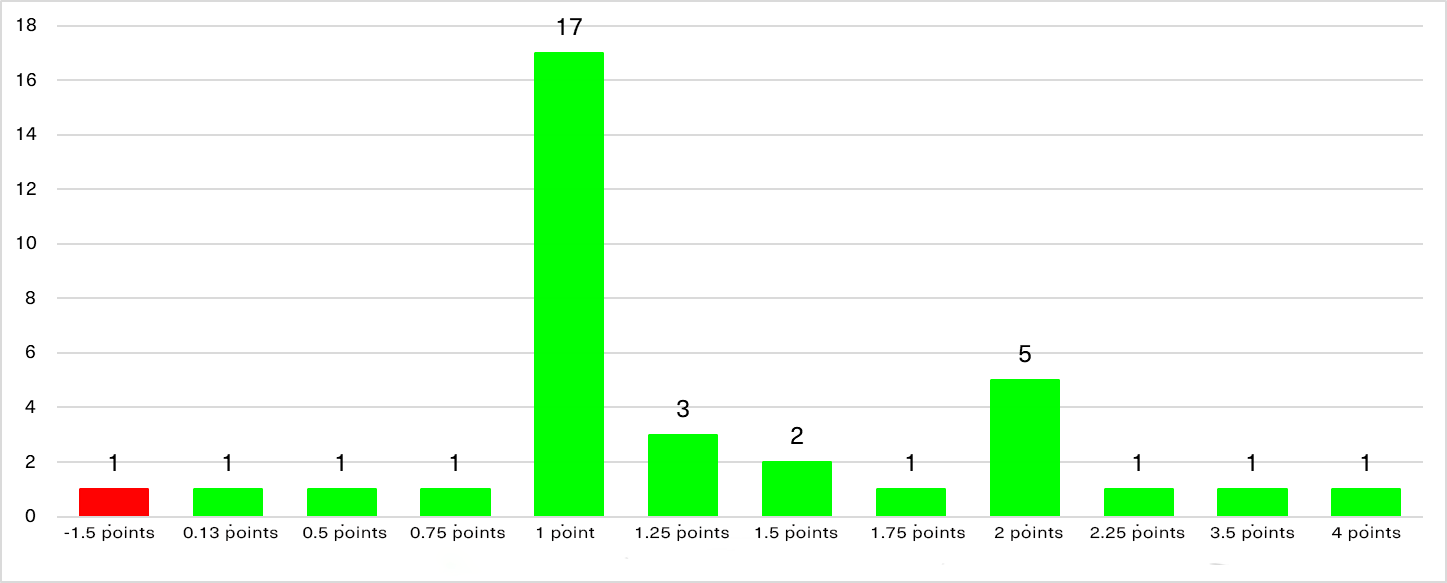
Source: Issues 242-248 of the Reform Index
Among the three most impactful positive changes of the period is the ratification of the Rome Statute of the International Criminal Court (+4 points). This decision enables Ukraine to participate in shaping the ICC’s agenda, nominate its candidates for the positions of judges and prosecutors, approve budget allocations, and utilize ICC mechanisms to investigate war crimes related to Russia’s aggression. The law prohibits the ICC from holding our military members accountable for the next seven years. However, Onysia Syniuk, an expert at the ZMINA Human Rights Center, notes that this provision is senseless: “Since November 2013, the ICC has been able to investigate international crimes committed on Ukrainian territory, regardless of whether they were perpetrated by Russian or Ukrainian citizens. There is no reason to believe this situation will fundamentally change with the ratification. Ukraine’s submission of a declaration stating that it will not recognize the Court’s jurisdiction over war crimes potentially committed by Ukrainian citizens for the next seven years is a controversial step, both in terms of equality and impartiality of justice and in how this declaration will ultimately be interpreted by the Court.”
The government’s efforts to counter Russia’s influence on Ukraine, this time in the religious sphere, received high marks from experts (+3.5 points). The Cabinet of Ministers developed a law banning the activities of churches headquartered in Russia or those supporting aggression against Ukraine. This decision sparked debates about the appropriateness of secular authorities intervening in religious matters, even drawing a response from the Pope. However, Ukrainians are well aware that the Russian Church is closely tied to the Russian government and regularly engages in efforts to discredit the Ukrainian state as tasked by that government. Therefore, its ban is a matter of national security.
The simplified granting of combatant status (+2.25 points) also scored above +2 points, which the experts view as the threshold separating significant reforms from smaller initiatives. This change is particularly important because it affects a substantial portion of Ukraine’s most dedicated citizens who have been defending the country against the aggressor. In the third quarter, approximately one million Ukrainians received this status for their participation in resisting Russian aggression since 2014. Their numbers continue to grow as the war and mobilization persist.
The simplified procedure applies to all military members except for intelligence officers and SBU employees, who will continue to receive their status after submitting a certificate of participation in combat operations for review by the commission on determining combatant status. This certificate, submitted through the Territorial Recruitment Centers (TRCs) or their commander, must be based on copies of combat reports, military journals, flight logs, etc. Under the simplified procedure, however, commanders will enter information about the execution of a combat order into the Unified State Register of War Veterans within five days of the start of the order’s execution. This entry will serve as the basis for the military personnel to obtain combatant status.
The main failure of the quarter was the law on the “white business club” (-1.5 points), which received a negative score from the experts on the Reform Index, indicating that it worsens business conditions in Ukraine. Oksana Kuziakiv, Executive Director at the Institute for Economic Research and Policy Consulting, explained: “The idea of a ‘white business club’ (businesses that pay taxes honestly) theoretically evokes positive associations, as it is based on a risk-oriented approach that ensures more rational use of the resources of inspection authorities, which are naturally insufficient to check everyone.
On the other hand, this undermines the fundamental principle of equal ‘rules of the game’ for everyone, as a group of enterprises will be designated to operate under different rules. Considering the numerous criteria and Ukraine’s previous experience, where special conditions created corruption risks and incentives to obtain them dishonestly, it appears that the law will not have a positive effect. Instead, it is likely to create and entrench unequal conditions in the market.”
All expert evaluations of regulatory acts from the Reform Index can be found at the link.
Progress by Reform Index areas
In the third quarter of 2024, reforms covered five out of the six areas under observation, with no changes in the energy sector. Most reforms occurred in the business environment (12) and the human capital sphere (11), although the latter saw much more substantial reforms. A nearly equal number of reforms took place in public governance (5), the monetary system (4), and public finances (3). However, in terms of total scores, public governance was the clear leader.
Graph 2. The sum of event scores by area, 3rd quarter of 2024
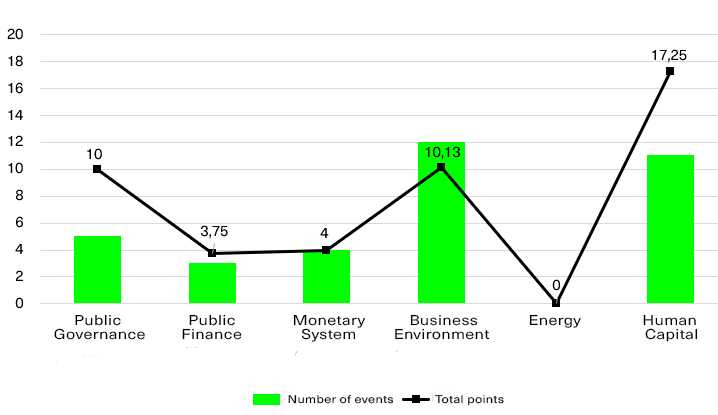
Source: Issues 242-248 of the Reform Index.
Human capital
Over three months, 11 reforms were recorded in this sphere, including two top reforms mentioned earlier: the ban on the activities of hostile churches and the automatic granting of combatant status to service members fighting on the front lines.
In the third quarter, change-makers focused on children’s rights and education. The law on preventing violence against children (+2 points) acknowledges that bullying can occur not only in educational settings but also in other child-focused environments (such as sports clubs, hobby groups, etc.). Consequently, all institutions working with groups of children are required to develop internal policies to combat violence. Local governments in communities must establish programs for both perpetrators and victims of violence. Victims may participate voluntarily, while perpetrators are mandated to attend these programs based on court decisions, parental requests, or voluntarily.
The government’s security risk assessment methodology for the education system (+1 point) enables the measurement of the war’s impact on specific educational institutions. There are five risk levels — from satisfactory, allowing in-person learning, to insurmountable, applied to schools in occupied territories and communities experiencing active hostilities. Risk levels will be considered when allocating state subsidies and selecting communities for the construction of shelters.
Significant changes are also anticipated in the preschool education system. The new law (+1 point) makes preschool education mandatory for children from the age of five and introduces a more flexible approach to its organization. Options now include mobile kindergartens (e.g., equipped vehicles like buses), family-based kindergartens (in private homes), and mini-kindergartens (up to five children). The law also addresses the diverse needs of children and their families: facilities must accommodate individuals with limited mobility, and groups offering education in national communities’ native language must be established at parental request. Additionally, children with hearing impairments must be provided with education in sign language.
Reforms have also reached upper secondary education. The government approved the state standard for specialized secondary education (+2 points), which will come into effect on September 1, 2027, with pilot programs starting in 2025. Under this new approach, students in high schools (grades 10–12), colleges, and vocational schools will be able to choose a general secondary education profile within four broad clusters: natural sciences, language and literature, history and social studies, and IT. With each grade, the number of hours dedicated to general subjects will decrease, while the number of hours for specialized subjects and elective disciplines will increase.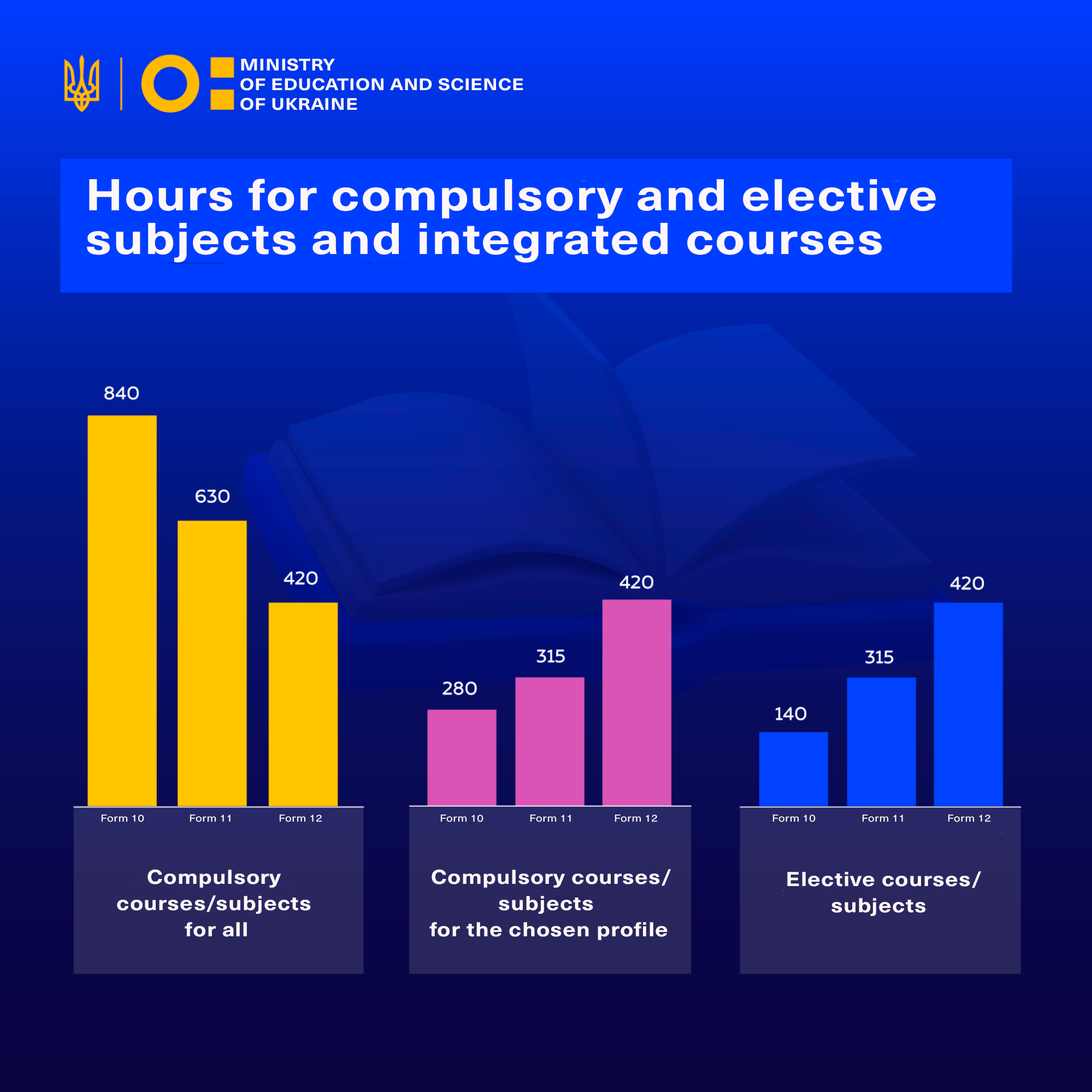
Several changes concern the healthcare sector. At the intersection of education and healthcare is the introduction of dual education for medical professionals (+1 point). Initially, this concept will be piloted in the “Therapy and Rehabilitation” specialty at four universities participating in the trial. Practical training will comprise 45% to 60% of the total study time. This form of education will be available to students who have already completed at least three years of their professional studies.
Additionally, the National Health Service of Ukraine is testing new approaches to hospital financing. This involves a medium-term contracting model (+1.25 points). Contracts lasting up to three years will be available to primary care facilities, emergency care providers, and specialized (cluster and supra-cluster) hospitals.
The government has approved a change that will simplify research in the medical field (+1 point) by regulating the operation of biobanks, which store human biological samples (blood, saliva, hair, etc.). Hospitals, pharmaceutical companies, and universities will be able to create or use biobank services, but solely for biomedical research and applying the results to healthcare. Biobank owners must obtain mandatory consent from donors to collect their biological samples and associated data.
According to the experts, laying the groundwork for activities in the cultural sphere in de-occupied territories was a positive step. The government has established a reserve of cultural and information workers for such efforts (+1 point). This is “essential even before the deoccupation of these areas to prevent an institutional vacuum after their long-awaited liberation,” explains Mila Shevchenko, a project coordinator at the NGO Crimea SOS. However, participants in this reserve may face risks, as noted by MP Vitalii Bezgin: “The issue of safety will arise: are they ready to leave their families and go to places where they might be shot? I don’t want to scare anyone, but such risks exist in areas that have been occupied for ten years, where people’s minds have been saturated with Russian propaganda and hatred toward us.”
Business environment
In this sector, 11 reforms and the aforementioned anti-reform effort — the “white business club” — took place during the third quarter.
Most of these reforms focused on regulating various industries to harmonize Ukrainian legislation with European standards. New operating rules were introduced for winemakers (+1 point), producers and importers of chemical substances in quantities exceeding 1 ton per year (+1.25 points), and non-residents engaged in construction work (+1.75 points).
The government has undertaken efforts to organize the transportation sector. The Ministry of Communities and Territories Development of Ukraine committed to creating a registry of legal bus stations (+1.5 points). Under the new rules, bus station owners must voluntarily submit their information to the registry (before 2020, passenger transport operations were licensed, and submitting this information was mandatory). However, only stations listed in the registry can be included in the route schedules. To register a station, the owner must verify property ownership in the State Register of Real Estate Rights. This verification aims to make station ownership transparent and help passengers and carriers file complaints “to the right address.” Additionally, the government has revised its approach to passenger safety insurance (+1.5 points). Previously, passengers insured themselves when purchasing a ticket, with this information indicated on the ticket. Now, similar to automobile drivers, carriers will insure their liability. The government’s directive regulates intercity passenger transport and covers insurance for harm to passengers’ lives and health, as well as damage to their baggage.
Several changes impacted the pharmaceutical market. The law on parallel import of medicines (+0.13 points) allows importing drugs not only through manufacturers but also through their authorized dealers, aiming to increase medication availability and lower prices. To prevent counterfeiting, the government introduced 2D coding on drug packaging (+1 point), which will become mandatory in 2028. Additionally, a new law on drug labeling (+1 point) prohibits placing advertisements on medicine packaging to protect consumers from manipulative marketing.
The law on preventing industrial pollution (+1 point) introduces a unified, integrated permit for emissions, replacing separate permits for air emissions, special water use, and waste management. To obtain this permit, industrial enterprises must modernize their equipment environmentally and adopt European management practices to reduce industrial pollution. Oksana Kuziakiv, Executive Director at the Institute for Economic Research and Policy Consulting (IER) commented that this is “an important step toward aligning Ukraine with European Union standards, as the law implements the requirements of Directive 2010/75/EU of the European Parliament and the Council on industrial emissions. It will improve the environmental situation in the country, enhance Ukraine’s chances of EU integration, and make our products more competitive in the European market.” However, Ukrainian manufacturers, particularly the industrial association “Ukrmetallurgprom,” are less optimistic. They point out that “unlike the EU Directive, Ukrainian industry faces a maximum seven-year period for temporary deviations from the Best Available Techniques (BAT) and cannot obtain special permits for facilities slated for closure due to the economic infeasibility of modernization for more than ten years (per Article 29, Part 5), i.e., until 2035. Given ongoing active hostilities, power supply disruptions, limited access to financing, and the impossibility of implementing large-scale investment projects, this could lead to the closure of most large Ukrainian industrial facilities.”
Public governance
In the third quarter, we recorded five significant changes in this area. Alongside the ratification of the Rome Statute of the International Criminal Court, the most impactful reform of the quarter, there was notable progress in decentralization and digitalization of public services.
In the fall, the President signed a law restoring medium-term budget planning at the local level (+2 points). “ Medium-term planning at the state budget level was reinstated last year (the Budget Declaration was approved this year), so it was logical to extend this to local budgets,” explains Yuliia Markuts, head of the Center of Public Finance and Governance Analysis at the Kyiv School of Economics. This law allows local budgets to be approved with a deficit if justified, such as investments in long-term financial instruments. It also clarifies the rules for obtaining local loans. Local communities will now be able to refinance previous debts on more favorable terms and secure loans under guarantees approved by the Ministry of Finance. This aims to reduce the debt burden on community budgets.
The law on the Institute of Starostas (+1 point) also marks a positive change. Previously, a starosta district could only be established if it had at least 500 residents. Now, districts can be created in sparsely populated areas with just 200 residents. The law also revises the rules for appointing and dismissing starostas: a starosta may resign voluntarily in cases of occupation or encirclement of their district, and in the event of mobilization, the community head may appoint someone to temporarily fulfill their duties. Additionally, the community head may unilaterally appoint a starosta if the local council rejects three proposed candidates or fails to convene for more than three months without valid reasons.
The Reform Index experts awarded +2 points to the eDozvil (“ePermit”) system, which digitizes the permitting process. “ Currently, the state burdens individuals and businesses with the responsibility of providing documentation to confirm permissions already issued by the state. This consumes significant time for both businesses and individuals,” explains Oleksandr Pochkun, co-founder and managing partner of Baker Tilly Ukraine. “With ePermit, state authorities or entities requiring documentation will be able to access it directly through an electronic system, enabling them to conduct necessary checks without involving the business or individual in providing such documents.”
The Urban Planning Cadastre is also moving online (+1 point). From the beginning of its operation, all approvals and amendments to urban planning documentation must be carried out exclusively through the Urban Planning Documentation Register within the Urban Planning Cadastre. This requirement applies even to projects initiated before its implementation.
Who is the biggest reformer?
For the second consecutive year—since the beginning of 2023—the Cabinet of Ministers has been the primary driver of reforms. This time, the government initiated 20 out of the 35 reforms adopted in the third quarter, comprising 16 resolutions and four draft laws. Additionally, the list of reforms includes an order from the Infrastructure Ministry stipulating that carriers, rather than passengers, are responsible for insuring transportation trips (+1.5 points). MPs registered eight reform laws, the National Bank of Ukraine developed four reforms, and the President initiated two.
Graph 3. Reform initiators in the 3rd quarter of 2024
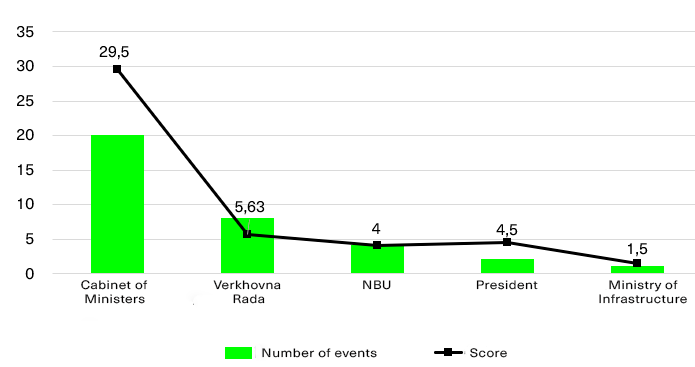
Source: Issue 242-248 of the Reform Index
In the third quarter of 2024, compared to the previous quarter:
- The number of reforms remained nearly unchanged: 35 compared to 36 in Q2.
- The average round score remained low, at 0.86 points (0.76 points in Q2) on a scale from -5 to +5.
- The average score per event was the same as in the previous quarter, at 1.3 points.
Graph 4. Average quarterly value of the Reform Index
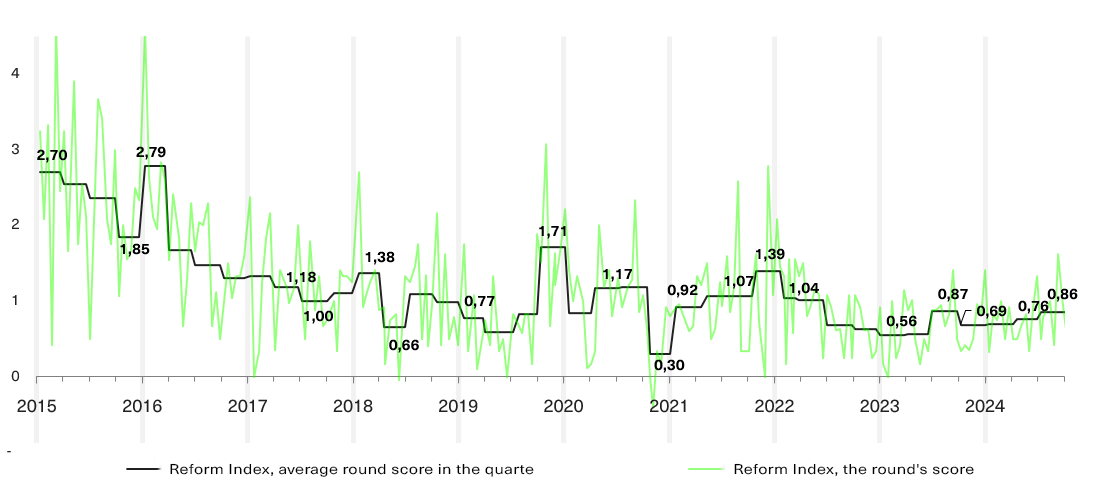
Source: Issues 1-248 of the Reform Index
Conclusion
In the third quarter, reforms primarily focused on the business environment and human capital sectors. In the former, European integration served as the driving force, with most changes aligning Ukraine’s business regulations with EU standards. In the latter, reforms were shaped by the ongoing war and the needs of the future reconstruction. The reform measures adopted during the third quarter aim to foster an inclusive and safe educational environment and accelerate youth integration into the labor market.
Most of the changes enacted this quarter, if properly implemented, will deliver results only in the medium- to long-term. The fact that the government is not merely “putting out fires” but also working toward the future inspires optimism.
Photo: depositphotos.com/ua
Attention
The author doesn`t work for, consult to, own shares in or receive funding from any company or organization that would benefit from this article, and have no relevant affiliations



